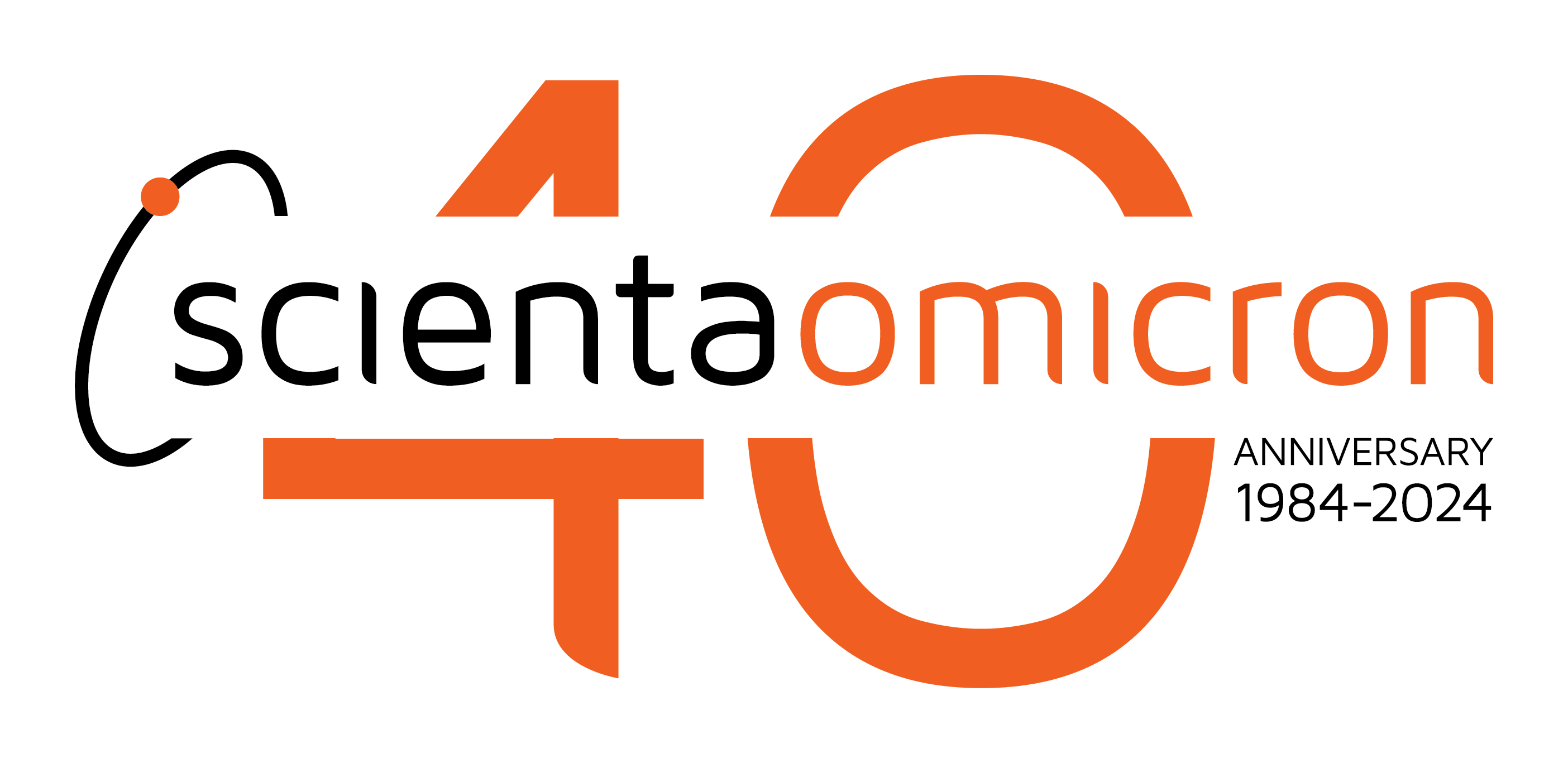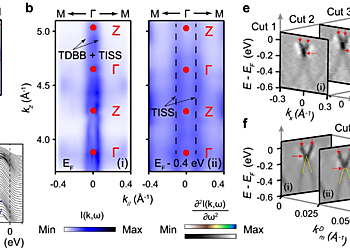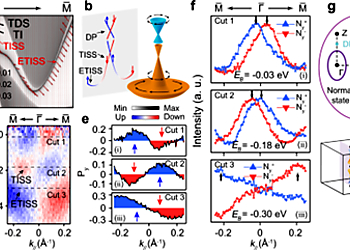Dual topological states in the layered titanium-based oxypnictide superconductor BaTi2Sb2O
Result of the Month
In this work, we have identified both TI and bulk DP states reminiscent of those in iron-based superconductors but with Dirac cones below EF in superconducting BaTi2Sb2O samples using angle-resolved photoemission spectroscopy (ARPES) and first-principles calculations. Moreover, spin-resolved ARPES measurements confirmed both of the predicted spin-helical surface TI bands and TDS bands, which are prospective to harbour Majorana zero modes and Majorana flat bands in one single material when the superconducting gap open as probed in our scanning tunneling microscopy (STM) measurement. This titanium-based oxypnictide superconductor which has the similar multiple topological states as iron-based superconductors would provide another parallel but more practical playground for comparative study on TSC.
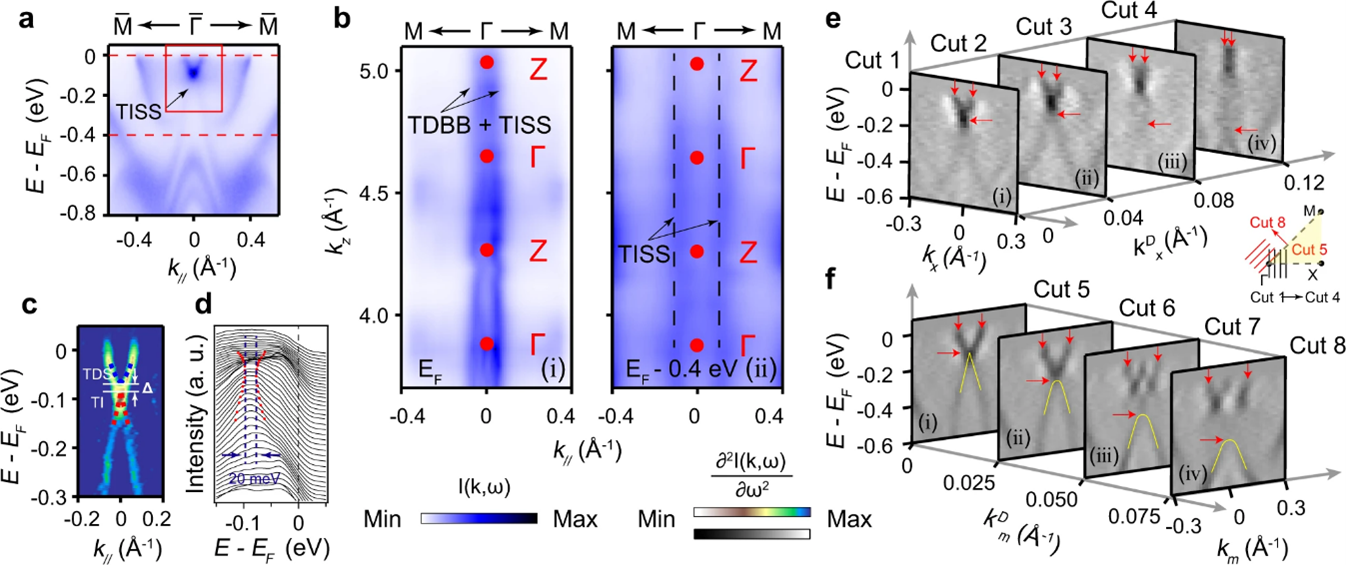
a Intensity plot along Γ¯ -M¯ direction with s-polarized 52 eV photons. The sharp surface states (TISS) near Γ¯ point are dominated. b Intensity plot of kz dependent ARPES data along Γ-M direction with s-polarized photons at EF(i) and EF - 0.4 eV (ii), which indicate the kz dispersion of TDBB hybridizating with TISS and TISS, respectively. c, d Second derivative plot and EDCs of the region in the red box in (a). A gap between two Dirac points is marked. e, f Second derivative intensity plots taken at kDx = 0, 0.04, 0.08, 0.12 Å−1 and kDm = 0, 0.025, 0.05, 0.075 Å−1, respectively. Cuts 1 to 8 are illustrated.
ARPES experiments
High-resolution and spin-resolved ARPES measurements were performed at 03U and “Dreamline” beam lines of Shanghai Synchrotron Radiation Facility (SSRF), respectively. The 03U endstation is equipped with a Scienta Omicron DA30-L electron analyzer. All ARPES data were taken at 15 K in an ultrahigh vacuum better than 8.0 × 10−11 Torr. The angular and the energy resolutions were set to 0.2∘ and 6 ~ 20 meV (dependent on the selected probing photon energy), respectively. The spin-resolved ARPES at “Dreamline” is equipped with a Scienta Omicron DA30-L electron analyzer together with a Ferrum VLEED spin detector.
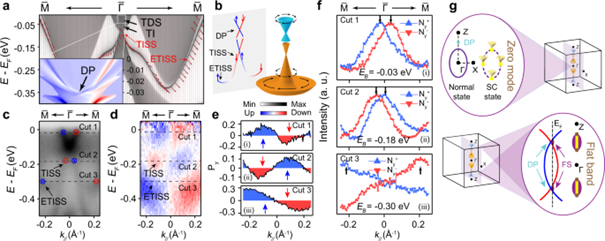
a Calculated spin texture along Γ¯-M¯ direction. Inset: the enlarged image of the white box region. b Sketch of the spin-polarized characteristics of TDS and TI surface states. The red and blue lines express spin down and up, respectively. c, d Intensity plot measured without and with y direction spin-polarized along Γ¯-M¯ direction. The red and blue parts express spin direction along -y and +y, respectively. e Spin polarization at Cut 1 to 3 in (d), indicating the spin texture of TDSS, TISS and ETISS. f Spin resolved MDCs taken at Cut 1 to 3. g Sketch of the dual topological superconductivity states induced by TDS states.
--
Authors: Z. Huang, W. L. Liu, H. Y. Wang, Y. L. Su, Z. T. Liu, X. B. Shi, S. Y. Gao, Z. Y. Chen, Y. J. Yan, Z. C. Jiang, Z. H. Liu, J. S. Liu, X. L. Lu, Y. C. Yang, R. X. Zhou, W. Xia, Y. B. Huang, S. Qiao, W. W. Zhao, Y. F. Guo, G. Li & D. W. Shen
Affiliations:
1. Center for Excellence in Superconducting Electronics, State Key Laboratory of Functional Materials for Informatics, Shanghai Institute of Microsystem and Information Technology, Chinese Academy of Sciences, Shanghai, 200050, China
Z. Huang, W. L. Liu, Z. T. Liu, Z. C. Jiang, Z. H. Liu, J. S. Liu, X. L. Lu, Y. C. Yang, S. Qiao & D. W. Shen
2. Center of Materials Science and Optoelectronics Engineering, University of Chinese Academy of Sciences, 100049, Beijing, China
Z. Huang, W. L. Liu, Z. H. Liu & D. W. Shen
3. School of Physical Science and Technology, ShanghaiTech University, Shanghai, 201210, China
Z. Huang, W. L. Liu, H. Y. Wang, Y. L. Su, R. X. Zhou, W. Xia, Y. F. Guo & G. Li
4. State Key Laboratory of Advanced Welding and Joining, Harbin Institute of Technology, Shenzhen, 518055, China
X. B. Shi & W. W. Zhao
5. Flexible Printed Electronics Technology Center, Harbin Institute of Technology, Shenzhen, 518055, China
X. B. Shi & W. W. Zhao
6. Beijing National Laboratory for Condensed Matter Physics and Institute of Physics, Chinese Academy of Sciences, 100190, Beijing, China
S. Y. Gao
7. Hefei National Laboratory for Physical Sciences at the Microscale, and Department of Physics, University of Science and Technology of China, Hefei, 230026, China
Z. Y. Chen & Y. J. Yan
8. Institute for Advanced Study, Tsinghua University, 100084, Beijing, China
R. X. Zhou
9. ShanghaiTech Laboratory for Topological Physics, ShanghaiTech University, Shanghai, 201210, China
W. Xia, Y. F. Guo & G. Li
10. Shanghai Synchrotron Radiation Facility, Shanghai Advanced Research Institute, Chinese Academy of Sciences, 201204, Shanghai, China
Y. B. Huan
Corresponding Authors:
Y. F. Guo, G. Li or D. W. Shen
Publicaton:
Huang, Z., Liu, W.L., Wang, H.Y. et al. Dual topological states in the layered titanium-based oxypnictide superconductor BaTi2Sb2O. npj Quantum Mater. 7, 70 (2022). https://doi.org/10.1038/s41535-022-00477-z
